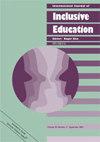Policy intents and the enactment of inclusion in prestigious schools in urban China: can equity and excellence coexist?
IF 1.8
3区 教育学
Q2 EDUCATION & EDUCATIONAL RESEARCH
International Journal of Inclusive Education
Pub Date : 2023-10-09
DOI:10.1080/13603116.2023.2266700
引用次数: 0
Abstract
ABSTRACTThis article addresses the policy intents regarding inclusive education in the Chinese basic education sector, prestigious school principals’ and teachers’ understanding of inclusion, and their current enactment of inclusion in delivering education. Through document analysis and semi-structured interviews, we find that inclusion in China can be understood in two broad categories. One concerns even development and equal access to educational opportunities between regions of different economic development, while the other concerns equal rights and educational opportunities between students with special educational needs and students in regular classrooms. In terms of enactment, the teachers and principals at the prestigious schools sampled focus on different issues to those highlighted in policy documents. Inclusion is often discussed in relation to competition, quality, and outcomes in the schools, rather than access to education and the learning process. When it comes to inclusion criteria, prestigious schools substantively exert their influence to exclude certain students, due to their self-image of excellence. However, based on the ideology of human capital theory, excellence and equity are not seen as incompatible goals in the Chinese educational system.KEYWORDS: Inclusionassessmentequityexcellenceurban China Disclosure statementNo potential conflict of interest was reported by the authors.Notes1 Quanna means ‘all included’ in Chinese.2 Ronghe means ‘to integrate, to merge, to mix’ in Chinese.3 It should be mentioned that the term abnormal is generally considered insulting, hurtful, or offensive. However, the interview transcript presents an accurate rendition of what was said.Additional informationFundingThis work was supported by the research project Education Access under the Reign of Testing and Inclusion (PI Christian Ydesen) funded by a Sapere Aude grant from the Independent Research Fund Denmark (Danmarks Frie Forskningsfond) under Grant no. 8047-00063B].Notes on contributorsYoujin RuanDr. Youjin Ruan is currently a teaching assistant at the Department of Culture and Learning, Aalborg University. Her main research interests are policy and practice around educational assessment and inclusive education, comparative education, learner-centred pedagogical design.Baocun LiuDr. Baocun Liu is a professor of comparative education and the director of the Institute of International and Comparative Education at Beijing Normal University. He also serves as the president of the China Comparative Education Society. He has been involved in a wide range of national and international research and consultancy projects and has published more than 300 journal papers and 20 books.Tengteng ZhuangDr. Tengteng Zhuang is currently an assistant professor affiliated with Institute of Higher Education, Faculty of Education, Beijng Normal University. He works on comparative education, higher education, and education policies. He has published more than 30 SSCI and CSSCI journal articles and two monographs on China’s higher education.中国城市名校的政策意图与包容性:公平与卓越能否共存?
摘要本文探讨了中国基础教育界关于全纳教育的政策意图、名校校长和教师对全纳教育的理解,以及他们在实施全纳教育中的现状。通过文献分析和半结构化访谈,我们发现中国的包容性可以分为两大类。一个是关于不同经济发展地区之间的发展和平等获得教育机会,另一个是关于有特殊教育需要的学生和普通教室的学生之间的平等权利和教育机会。在制定方面,抽样调查的名校教师和校长关注的问题与政策文件中强调的问题不同。包容性通常与学校的竞争、质量和成果有关,而不是与受教育的机会和学习过程有关。在录取标准上,名牌大学以“优秀的自我形象”为基础,对某些学生施加了实质性的影响。然而,基于人力资本理论的意识形态,卓越与公平在中国的教育体系中并不被视为是不相容的目标。关键词:纳入、评估、质量、卓越、城市中国披露声明作者未发现潜在利益冲突。注:1“全纳”在汉语中的意思是“包括在内”,2“融和”在汉语中的意思是“整合、合并、混合”。3应该提到的是,“不正常”一词通常被认为是侮辱、伤害或冒犯性的。然而,采访记录是对谈话内容的准确再现。本研究得到了“测试和包容统治下的教育获取”研究项目(PI Christian Ydesen)的支持,该项目由丹麦独立研究基金(Danmarks Frie Forskningsfond)的Sapere Aude资助,资助号为:8047 - 00063 b]。贡献者阮友金笔记。阮友进现为奥尔堡大学文化与学习系助教。主要研究方向为教育评估与全纳教育、比较教育、以学习者为中心的教学设计等方面的政策与实践。Baocun LiuDr。刘宝存,北京师范大学比较教育学教授,国际与比较教育研究所所长。他还担任中国比较教育学会会长。他参与了广泛的国内和国际研究和咨询项目,发表了300多篇期刊论文和20多本书。Tengteng ZhuangDr。庄腾腾现任北京师范大学教育学院高等教育研究所助理教授。他的研究领域包括比较教育、高等教育和教育政策。发表SSCI、CSSCI期刊论文30余篇,专著2部。
本文章由计算机程序翻译,如有差异,请以英文原文为准。
求助全文
约1分钟内获得全文
求助全文
来源期刊

International Journal of Inclusive Education
EDUCATION & EDUCATIONAL RESEARCH-
CiteScore
7.50
自引率
9.10%
发文量
97
期刊介绍:
The International Journal of Inclusive Education provides a strategic forum for international and multi-disciplinary dialogue on inclusive education for all educators and educational policy-makers concerned with the form and nature of schools, universities and technical colleges. Papers published are original, refereed, multi-disciplinary research into pedagogies, curricula, organizational structures, policy-making, administration and cultures to include all students in education. The journal does not accept enrolment in school, college or university as a measure of inclusion. The focus is upon the nature of exclusion and on research, policy and practices that generate greater options for all people in education and beyond.
 求助内容:
求助内容: 应助结果提醒方式:
应助结果提醒方式:


